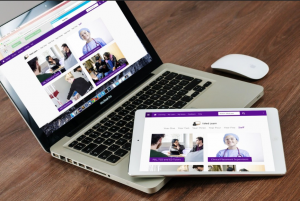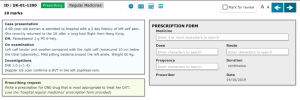Authentic Prescribing Safety Assessment
Rachel Heyes is a Learning Technologist within FBMH eLearning who is assigned to support the MBChB Medicine programme at the University of Manchester. Rachel is an experienced teacher, and creative content producer who is interested in supporting academics and clinicians to use eLearning tools confidently, and successfully. She draws on her educational experience to promote the use of technology and learning design that is fully accessible, proven to support learners, and has real world applications. Rachel is also an editor for the Association of Learning Technologists (ALT) blog, and a Principal Examiner for Cambridge Assessment International Education.
is a Learning Technologist within FBMH eLearning who is assigned to support the MBChB Medicine programme at the University of Manchester. Rachel is an experienced teacher, and creative content producer who is interested in supporting academics and clinicians to use eLearning tools confidently, and successfully. She draws on her educational experience to promote the use of technology and learning design that is fully accessible, proven to support learners, and has real world applications. Rachel is also an editor for the Association of Learning Technologists (ALT) blog, and a Principal Examiner for Cambridge Assessment International Education.
Improving medical students’ prescribing skills
Medical educators understand that competent prescribing is a key skill for newly qualified doctors. All UK medical students take a comprehensive national examination in their final year of study: the Prescribing Safety Assessment (PSA). The PSA is a high stakes exam; a pass is required by the General Medical Council (GMC) for junior doctors to progress through their training programmes. The PSA platform uses electronic prescribing to recreate current real-world practice in hospital and community healthcare and is used within summative assessment of prescribing in clinical exams at our medical school

Figure 1 – University of Manchester (2020) 1Med Learn
Currently, the ‘Prescribing and Medicines Safety’ team set formative assessment questions related to the case material for students to practice their prescribing skills on the PSA platform. It makes sense to have these activities linked to their 1Med Learn case materials to replicate clinical work and create authentic assessment. The extensive use of electronic prescribing systems (EPS) throughout primary and secondary care settings means that all undergraduate medical students need to learn with, and alongside such technology, rather than through the creation and review of handwritten practice prescriptions.

Figure 2 – British Pharmacological Society (2023) prescribingsafetyassessment.ac.uk
Kurt Wilson, Professor of Medical Education at University of Manchester (UoM) who is a member of the ‘Prescribing and Medicines Safety’ (PMS) team approached me to develop an Electronic Prescription Service (EPS) tool within 1Med Learn, which would make these assessments more authentic.
The initial stage of this project involved discussions between eLearning specialists, and prescribing specialist academic clinicians, to identify and understand their initial ideas and the requirements of the proposed 1Med Learn PSA tool. The concept was to replicate the format of questions used within the PSA, within 1Med Learn. Initial meetings, and discussions were an important element of the project’s success. It was vital to ensure that all parties understand each other and formed a good working relationship. Learning Technologists really appreciate working with academics who have ideas as to how to potentially make improvements to their learning content, and who also value the importance of involving eLearning at an early stage. Early involvement in discussions means that eLearning can contribute to idea generation and development processes, alongside gaining invaluable insight to the project work and the working preferences of academics, or clinicians. This allows eLearning to work more effectively with academics, and clinicians to achieve the best outcome for authentic assessment.
Follow-up meetings dedicated to creative exploration, and discussion were valuable and important in relation to developing not just the project ideas or concepts, but also the group’s working relationships. Once a supportive working environment was established, creative thinking and problem-solving skills were enhanced and the ideas generated become more fine-tuned, sophisticated, and likely to succeed. Follow-up meetings were also very enjoyable, and it would be fair to say that eLearning professionals find working with academics on projects like this one rewarding and beneficial to teaching and learning practices. Working with eLearning also benefits academic and clinical members of staff, as it may equip them with a greater understanding in relation to the technological tools that could benefit their own teaching and learning practices. Many eLearning professionals form close working relationships with specific academics, or clinicians. This allows them to continue collaborating to further support teaching and learning activities, which enables both parties to achieve their goals and provide the best experience for students.
The most exciting feature of our proposed tool was that it would utilise the British Pharmacological Society’s extensive database of medications. The database is invaluable to the students in making the assessment truly authentic as it allows them to select the medicines, doses, and routes in keeping with electronic prescribing used in clinical practice, whilst mirroring the platform used for the PSA. The BPS team developed the API for the tool, and with the help of an externally contracted developer, we were able to create the 1Med Learn PSA tool.

Figure 3 – Photo by Tony Schnagl from Pexels (2020). Edited by Rachel Heyes, University of Manchester (2022) 1Med Learn PSA Tool.
The 1Med Learn PSA tool has been designed specifically for medical education so along with opportunities for students to practice electronic prescribing in a safe environment, it will facilitate automatic marking of student prescriptions and opportunities for remote learning with tailored feedback provided in response to student prescription inputs. Students on the programme will therefore gain hands-on experience of EPS and the PSA during their clinical years, providing many opportunities for authentic assessment to prepare them for their local medical school assessments and their national PSA exam in the final year. There was of course, a lengthy process of testing. I have been able to manage this process and working with so many different people has been an invaluable experience. Using project management and communication skills. I was well placed as someone who understood the ‘language’ of both the academic clinicians, and the developers/programmers, and so I was able to translate requirements between the two groups and lead the project to the point of implementation. In the next academic year, students on the medical programme will benefit from authentic assessment using the 1Med Learn PSA tool within their online cases, and we will review the impact of the tool alongside its continued development. Teamwork makes the dream work!
“The ‘Prescribing & Medicines Safety’ and eLearning teams have made fantastic progress in collaboration with the technical team at the British Pharmacological Society. This ground-breaking work paves a new path to successful integration of electronic prescribing into teaching, learning and assessment as our students’ progress through their clinical years. For the first time, we can integrate key skills required for practice in 21st century electronic healthcare directly into our case-based learning throughout our course and do so in a way that is safe, realistic and will be valued by tutors and students.” – Prof Kurt Wilson
“I’m excited to see this new, tailored prescribing education content in action at the University of Manchester. Collaborations like this should have a really positive impact on prescribing safety around the country, as more and more newly qualified prescribers enter the workforce having had the opportunity to get realistic hands-on prescribing practice with cases that simulate the challenges they will face in the workplace. Manchester’s medical students are getting a real head start in preparing for their final year assessments, as well as gaining valuable experience of electronic prescribing systems and real-life prescribing challenges. I look forward to seeing more collaborations like this one in the future.” – Professor Simon Maxwell, PSA Medical Director (British Pharmacological Society, 2023)
References
British Pharmacological Society (BPS). (2023). Manchester improve medical students’ prescribing skills with our online platform | BPS Assessment. BPS Assessment | Driving improvement in medication safety worldwide, through knowledge assessment and learning. [online]. Available from: https://www.bpsassessment.com/manchester-improve-medical-students-prescribing-skills-with-our-online-platform/ [Accessed March 24, 2023].
Heyes, R. and Wilson, K. (2022). Improving medical students’ prescribing skills through bespoke electronic prescribing systems. FBMH News. [online]. Available from: https://blogs.bmh.manchester.ac.uk/blog/2022/12/01/improving-medical-students-prescribing-skills-through-bespoke-electronic-prescribing-systems/ [Accessed March 24, 2023].







0 Comments